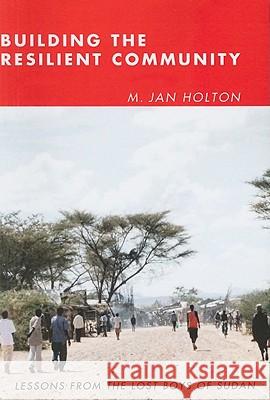Building the Resilient Community: Lessons from the Lost Boys of Sudan » książka
Building the Resilient Community: Lessons from the Lost Boys of Sudan
ISBN-13: 9781608992454 / Angielski / Miękka / 2011 / 188 str.
Building the Resilient Community: Lessons from the Lost Boys of Sudan
ISBN-13: 9781608992454 / Angielski / Miękka / 2011 / 188 str.
(netto: 90,50 VAT: 5%)
Najniższa cena z 30 dni: 94,76
ok. 16-18 dni roboczych
Dostawa w 2026 r.
Darmowa dostawa!
Description: How do some communities around the world that suffer outrageous violence and trauma manage, with few outside resources, not only to survive, but to thrive? September 11, the devastation of hurricane Katrina, school shootings, and other events of community violence and trauma have taught us, as a nation and a church, about the fundamental importance of building a caring community that fosters resilience and hope. Building the Resilient Communitytakes a refreshing turn of perspective by giving priority not only to the formally educated voices of the West but to those among the most marginalized and invisible in the world: refugees. Based on ethnographic research in Kakuma Refugee Camp and remote villages of southern Sudan, Holton presents a communal case study of a group of devoutly Christian refugees known as the Lost Boys of Sudan and asks the question, Might they have something to teach us about being a resilient community? As Holton investigates their deeply embedded cultural and religious beliefs that nurture a profound sense of responsibility toward others, we find a communal relationship that reflects a unique sense of care and obligation. This deep frame for communal care breaks through as the root of a remarkable faith narrative that serves to help mitigate symptoms of trauma and to undergird resilience, and may do the same for us. Endorsements: ""Jan Holton's stunning pastoral theological study of resilience among the Lost Boys of Sudan shows what the church and the world can learn from indigenous models of care such as those enacted by the Lost Boys . . . Clearly written, thoroughly researched, and forcefully argued, Holton's work will directly benefit those working in refugee and internally displaced populations, in their countries of origin and in their places of sanctuary, including physicians, nurses, psychologists, non-governmental organizations, and faith communities. Beyond those audiences, it reminds all caring communities to tune themselves to unexpected ways of healing within their midst."" --Pamela D. Couture Jane and Geoffrey Martin Chair in Church and Community Emmanuel College of Victoria University University of Toronto ""Building the Resilient Community is a brilliant portrayal of how the Lost Boys of the Sudan were able to survive unspeakable destruction through the power of communal obligations of care and the faith narratives of the Dinka people in Sudan . . . Jan Holton's book inspires hope for human endurance and flourishing, and connects resources for engaging trauma across cultures without co-opting or negating different ways of facing the evils of war, terrorism, and community catastrophe."" --Larry Kent Graham Iliff School of Theology About the Contributor(s): M. Jan Holton is Assistant Professor of Pastoral Care and Counseling at Yale University Divinity School."
Description:How do some communities around the world that suffer outrageous violence and trauma manage, with few outside resources, not only to survive, but to thrive? September 11, the devastation of hurricane Katrina, school shootings, and other events of community violence and trauma have taught us, as a nation and a church, about the fundamental importance of building a caring community that fosters resilience and hope. Building the Resilient Community takes a refreshing turn of perspective by giving priority not only to the formally educated voices of the West but to those among the most marginalized and invisible in the world: refugees. Based on ethnographic research in Kakuma Refugee Camp and remote villages of southern Sudan, Holton presents a communal case study of a group of devoutly Christian refugees known as the Lost Boys of Sudan and asks the question, Might they have something to teach us about being a resilient community? As Holton investigates their deeply embedded cultural and religious beliefs that nurture a profound sense of responsibility toward others, we find a communal relationship that reflects a unique sense of care and obligation. This deep frame for communal care breaks through as the root of a remarkable faith narrative that serves to help mitigate symptoms of trauma and to undergird resilience, and may do the same for us.Endorsements:""Jan Holtons stunning pastoral theological study of resilience among the Lost Boys of Sudan shows what the church and the world can learn from indigenous models of care such as those enacted by the Lost Boys . . . Clearly written, thoroughly researched, and forcefully argued, Holtons work will directly benefit those working in refugee and internally displaced populations, in their countries of origin and in their places of sanctuary, including physicians, nurses, psychologists, non-governmental organizations, and faith communities. Beyond those audiences, it reminds all caring communities to tune themselves to unexpected ways of healing within their midst.""--Pamela D. CoutureJane and Geoffrey Martin Chair in Church and CommunityEmmanuel College of Victoria University University of Toronto""Building the Resilient Community is a brilliant portrayal of how the Lost Boys of the Sudan were able to survive unspeakable destruction through the power of communal obligations of care and the faith narratives of the Dinka people in Sudan . . . Jan Holtons book inspires hope for human endurance and flourishing, and connects resources for engaging trauma across cultures without co-opting or negating different ways of facing the evils of war, terrorism, and community catastrophe.""--Larry Kent GrahamIliff School of TheologyAbout the Contributor(s):M. Jan Holton is Assistant Professor of Pastoral Care and Counseling at Yale University Divinity School.











